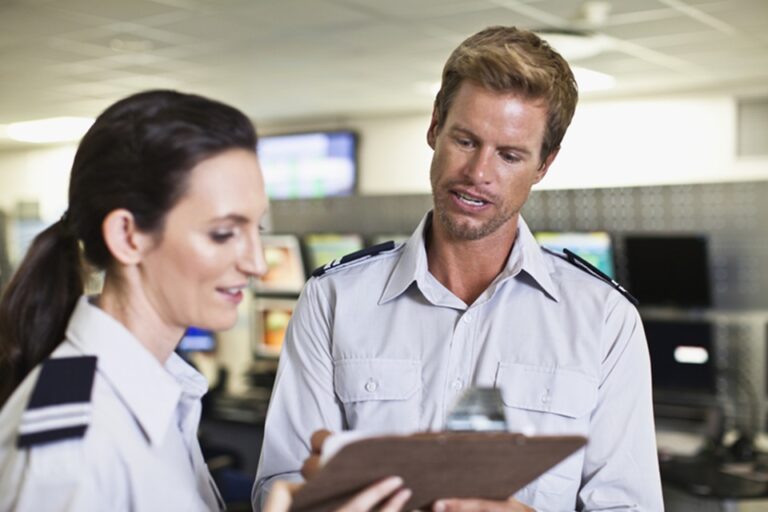Security guard services are pivotal in safeguarding people, property, and assets. In a world where threats come in various forms, effective security relies not only on physical prowess but also on the ability to communicate and interact with precision and empathy. Understand why communication skills are paramount for security guard services and how they contribute to maintaining a safe and secure environment here.
The Multifaceted Role Of Security Guards
Security guards are entrusted with many responsibilities, from patrolling premises and monitoring surveillance systems to responding to emergencies and providing a visible deterrent to potential threats. To fulfill these duties effectively, security guards must possess a diverse set of skills, with communication skills being the linchpin that ties them all together.
Precise Verbal Communication
- Clear Instructions: Verbal communication is vital for issuing clear and concise instructions to fellow security personnel, employees, or visitors. Whether guiding someone to a designated area or giving emergency evacuation directions, articulating information is paramount.
- Conflict Resolution: Security guards often find themselves in situations where conflict may arise. Verbal de-escalation techniques, including active listening and empathetic communication, can defuse potentially volatile situations without physical force.
- Reporting Incidents: Documenting incidents and observations is a crucial part of a security guard’s responsibilities. Accurate verbal reporting skills ensure that vital information reaches the appropriate parties promptly.
Clear Non-Verbal Communication
- Body Language: Non-verbal cues such as body language and facial expressions can convey a sense of authority, presence, and approachability. Security guards should be trained to use non-verbal cues effectively to maintain control and assertiveness.
- Observation Skills: Non-verbal cues are equally important for observing suspicious behaviour or identifying potential threats. Recognizing changes in demeanour, nervousness, or unusual actions can be vital in preventing security breaches.
Emergency Communication For Crisis Management
- Rapid Response: During emergencies, effective communication can be the difference between life and death. Security guards must communicate swiftly and accurately to alert relevant parties, such as the fire department, law enforcement, or medical personnel.
- Coordinating Response Teams: In complex security situations, security guards may need to coordinate efforts with law enforcement or other emergency response teams. Effective communication ensures a seamless transition of control and information.
Public Relations & Customer Service Communication
- Visitor Interaction: Security guards often serve as the first point of contact for visitors and employees entering a facility. Courteous and professional communication helps create a positive and welcoming environment.
- Information Sharing: Guards may be responsible for providing information or directions to visitors. Polite and helpful communication contributes to a smooth visitor experience.
Utilizing Technology For Effective Communication
- Surveillance Systems: Security guards are often tasked with monitoring surveillance systems. Understanding how to operate and communicate findings from these systems is crucial for identifying potential threats.
- Communication Devices: Familiarity with two-way radios, intercoms, and emergency alert systems is essential for real-time communication among security personnel and relevant authorities.
Situational Awareness & Preventive Communication
- Preventive Measures: Effective communication extends to proactive measures, such as identifying potential security vulnerabilities and reporting them promptly to mitigate risks.
- Security Alerts: Recognizing and communicating security alerts, such as unusual noises, unauthorized access, or equipment malfunctions, can prevent security breaches.
The Human Touch: Empathy & Compassion
- Emergency Response: In crises, conveying empathy and compassion when interacting with injured individuals or distressed witnesses can provide comfort and reassurance.
- Conflict Resolution: Empathy can be a powerful tool in de-escalating conflicts. Security guards who understand and acknowledge people’s emotions are more likely to reach peaceful resolutions.
Communication In Training & Skill Development
- Continuous Improvement: Security guards should regularly train in communication skills, crisis management, and conflict resolution. Staying updated on best practices ensures they can handle evolving security challenges.
- Simulated Scenarios: Training scenarios replicating real-life situations enable security personnel to practice and refine their communication skills in a controlled environment.
Effective communication skills are the bedrock upon which successful security guard services are built. While physical preparedness and technical expertise are crucial, the ability to communicate empathetically and professionally is equally important. Security guards act as the first line of defence against potential threats, and their capacity to communicate effectively can prevent incidents, resolve conflicts, and ensure the safety and well-being of people and property. In today’s complex and dynamic security landscape, security guard services must place a strong emphasis on communication skills. By investing in training and fostering a culture of effective communication, security providers can enhance their ability to deter threats, respond to emergencies, and provide the highest security and safety to their clients and the community.


